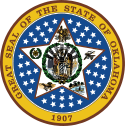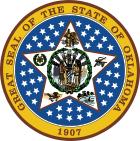- Oklahoma State Treasurer
-
Office of the Oklahoma State Treasurer 
Great Seal of Oklahoma Agency overview Formed November 17, 1907 Preceding agency Office of the Territorial Treasurer Headquarters Oklahoma State Capitol
Oklahoma City, OklahomaEmployees 67 unclassified Annual budget $150 million Agency executive Ken A. Miller, State Treasurer Website Office of the State Treasurer The State Treasurer of Oklahoma is the chief custodian of Oklahoma’s cash deposits, monies from bond sales, and other securities and collateral and directs the investments of those assets. The Treasurer provides for the safe and efficient operation of state government through effective banking, investment, and cash management.
The 18th and current State Treasurer of Oklahoma is Ken A. Miller.
Contents
Constitutional Requirements
As with all offices established by the Oklahoma Constitution in Article V, any person running for the office of State Treasurer of Oklahoma must be citizen of the State of Oklahoma, at least thirty-one years of age and a resident of the United States for ten years.
Election
Elections for the State Treasurer are held on a four year concurrent basis with the election of the Governor. After all votes are collected, the Legislature of Oklahoma shall convene in the hall of the House of Representatives and the Speaker of the House of Representatives announce the results of the elections in the presence of a majority of each branch of the Legislature. The persons having the highest number of votes for the office of the State Treasurer shall be declared duly elected. However, in case two or more shall have an equal and the highest number of votes for the office of State Treasurer, the Legislature shall, by joint ballot, choose one of the said persons having an equal and the highest number of votes for the office of State Treasurer.
Term(s) of Office
The State Treasurer’s four year term begins on the first Monday in January falling the general election and runs concurrently with that term of the Governor of Oklahoma. The Constitution of Oklahoma places no limit to the number of terms a candidate may serve in succession or in total.
Powers and Responsibilities
Oklahoma 
This article is part of the series:
Politics and government of
OklahomaConstitutionExecutiveLegislatureJudiciaryElectionsDivisionsFederal Relations
The State Treasurer has the following specific statutory and constitutional responsibilities:
-
- Receiving, depositing, and disbursing all state funds
- Investing temporary surplus funds
- Investing specific funds for other state agencies where authorized
- Requiring banks to furnish collateral sufficient to secure deposits of state and other public funds
- Paying of interest on the state's bonded debt and the redeeming of the debt at maturity
- Maintaining a safekeeping operation for securities owned by various state agencies, and those securities pledged as collateral to other state agencies
- Processing and distributing all State checks (known as warrants)
- Administering the Business Link and Agricultural Link Programs
- Administering the Unclaimed Property Program
Approximately $10 billion dollars is deposited each year at the State Treasurer's office into the Oklahoma State Treasury. This includes state tax revenues, such as income tax and gross production tax receipts; federal funds, such as matching funds for highway construction; and other tax revenues, such as the motor fuel tax, which are collected by the state but then apportioned to the counties and cities.
The State Treasurer has no power to impose taxes, set tax rates or collect taxes; only to make sure all public funds are properly accounted for once it has been collected or distributed by other executive branch entities. Also, the State Treasurer doesn't formulate the state's annual budget nor does the office have any authority to impound funds allocated by the Oklahoma State Legislature.
To earn additional revenue for Oklahoma, the State Treasurer invests money which is not immediately needed to fund government operations. The office has an average of $5 billion of taxpayers’ money in its investment portfolio. The Treasurer's investments are strictly governed by Oklahoma statutes and the Treasurer's investment policy.
Many of the Treasurer's duties require the advice of both the Governor of Oklahoma and the Attorney General of Oklahoma, such as the ability to determine the use of the State's surplus funds. Constitutionally the State Treasurer presides over or is a member of four state boards and commissions.
Commission Position Oklahoma College Savings Plan Board of Trustees Chairman Board of Investors of the Oklahoma Tobacco Settlement Endowment Trust Chairman State Industrial Finance Authority Non-Voting Member State Board of Equalization Member Relationship with the Governor
The State Treasurer is an independently elected officer with both Constitutional and Statutory authority. As such, the Governor has no direct authority over the State Treasurer. However, Oklahoma's history of electing Governors and Treasurers of the same party has often led to positive working relationships between the two offices. With Governor Mary Fallin and State Treasurer Ken A. Miller, both Republicans, Oklahoma has had a Governor and State Treasurer of the same party since 2003.
The State Treasurer is the state's elected chief fiscal officer and is directly accountable to the voters. In contrast, the Governor's Secretary of Finance reports directly to the Governor. Only once in recent history has a State Treasurer also served as the Governor's budget advisor; Governor Brad Henry appointed Miller's predecessor Scott Meacham as his Secretary of Finance and Revenue, giving Meacham supervision over all finance agencies of the State government.
When the Governor and State Treasurer are of different parties, the State Treasurer's role in State government is often minimal.
The Governor, acting through the Oklahoma Office of State Finance (whose Director serves at the pleasure of the Governor), can only suggest a budget to the Legislature, which is charged with crafting the funding decisions. The Governor does have veto power to influence the end result of the budget. The State Treasurer does not have the power to alter the budget or to impound funds, but the success of the Treasurer's investments influence the funds available for allocation.
Organization
- State Treasurer
- Deputy State Treasurer for Policy and Chief of Staff
- Revenue and Policy
- Deputy State Treasurer for Operations
- Unclaimed Property
- Banking Services
- Investments
- Internal Auditing
- Deputy State Treasurer for Communications and Program Administration
- Information Services
- Accounting
- Agency Services
- Deputy State Treasurer for Policy and Chief of Staff
Oath of Office
"I, ........., do solemnly swear (or affirm) that I will support, obey, and defend the Constitution of the United States, and the Constitution of the State of Oklahoma, and that I will not, knowingly, receive, directly or indirectly, any money or other valuable thing, for the performance or nonperformance of any act or duty pertaining to my office, other than the compensation allowed by law; I further swear (or affirm) that I will faithfully discharge my duties as State Treasurer of the State of Oklahoma to the best of my ability."
Office-Holders
The following is an incomplete list of those individuals who have serve as State Tresurer for Oklahoma:
Name Party Term Start Term End Cowboy Pink Williams Democrat 1963 1967 Claudette Henry Republican 1991 1995 Robert Butkin Democratic 1995 2005 Scott Meacham Democratic 2005 January 10, 2011 Ken Miller Republican January 10, 2011 present See also
Constitutional executive offices of Oklahoma 
State Treasurers of Oklahoma 
Current State Treasurers of the United States AL: Young Boozer (R)
AK: Patrick Galvin (R)*
AR: Martha Shoffner (D)
AZ: Doug Ducey (R)
CA: Bill Lockyer (D)
CO: Walker Stapleton (R)
CT: Denise L. Nappier (D)
DE: Chip Flowers (D)
FL: Jeffrey Atwater (R)*
GA: Tommy Hills (R)HI: Georgina Kawamura (R)*
IA: Michael Fitzgerald (D)
ID: Ron Crane (R)
IL: Dan Rutherford (R)
IN: Richard Mourdock (R)
KS: Ron Estes (R)
KY: Todd Hollenbach (D)
LA: John Neely Kennedy (R)
MA: Steve Grossman (D)
MD: Nancy K. Kopp (D)ME: David Lemoine (D)
MI: Andy Dillon (D)
MN: Tom Hanson (R)*
MO: Clint Zweifel (D)
MS: Tate Reeves (R)
MT: Dan Bucks (D)*
NC: Janet Cowell (D)
ND: Kelly Schmidt (R)
NE: Don Stenberg (R)
NH: Catherine Provencher (D)NJ: Andrew Eristoff (R)
NM: James Lewis (D)
NV: Kate Marshall (D)
NY: Thomas DiNapoli (D)*
OH: Josh Mandel (R)
OK: Ken A. Miller (R)
OR: Ted Wheeler (D)
PA: Robert McCord (D)
RI: Gina M. Raimondo (D)
SC: Curtis M. Loftis, Jr. (R)SD: Vern Larson (R)
TN: David H. Lillard Jr. (R)
TX: Susan Combs (R)*
UT: Richard Ellis (R)
VA: Manju Ganeriwala (D)
VT: Beth Pearce (D)
WA: James L. McIntire (D)
WI: Kurt Schuller (R)
WV: John Perdue (D)
WY: Joe Meyer (R)*No treasurer in this state; closest equivalent listed Categories:- Executive branch of Oklahoma government
- State treasurers of Oklahoma
-
Wikimedia Foundation. 2010.
